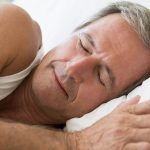Obstructive sleep apnoea (OSA) is a condition where the walls of the throat relax and narrow during sleep, interrupting normal breathing and causing profound sleepiness. For people with moderate or severe OSA, doctors usually recommend using a continuous positive airway pressure (CPAP) device, which consists of a small pump that delivers pressurised air into the nose through a mask, stopping the throat from closing.
Around 20 per cent of the adult population experiences breathing problems during sleep. In four to five per cent of middle-aged people, these problems lead to sleepiness in the daytime, classified as obstructive sleep apnoea syndrome. The condition is thought to be more common in older people, but it is not sure how prevalent this is, as patients and their relatives may attribute their sleepiness to old age, or older people can compensate by napping. The disease is becoming more common because obesity is a major risk factor.
The study, published in Lancet Respiratory Medicine, involved 278 patients aged 65 or over at 14 NHS centres in the UK. It was found that CPAP reduced the sleepiness of patients in the daytime and reduces healthcare costs. Also that CPAP should be offered routinely to older patients with OSA, and more should be done to raise awareness of the condition.
Patients with sleep apnoea sometimes stop breathing for 30 seconds or longer at night before they wake up and start breathing again. In these pauses, their blood oxygen levels fall.
“We think low oxygen levels at night might accelerate cognitive decline in old people, and studies have found that sleep apnoea causes changes in the grey matter in the brain. We’re currently researching whether treatment can prevent or reverse those changes,” said Professor Mary Morrell who is co principal of the study.
Dr. Renata Riha, of the Royal Infirmary of Edinburgh, added that sleep medicine spans many disciplines and is an important area of research which deserves greater support. “Sleep disorders impact on a wide variety of chronic conditions, including diabetes, heart attacks, strokes and possibly even cancer. Successful treatment diminishes this risk but we still have a great deal of work to do in the area,” she said.





